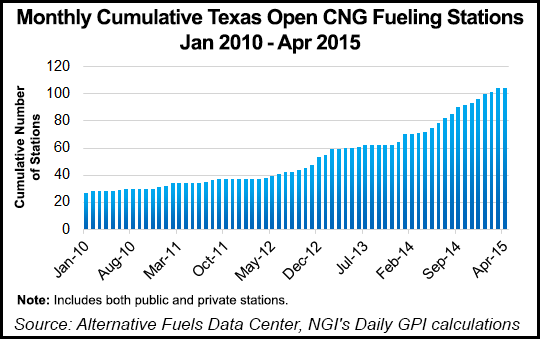Texas Embracing NGV Infrastructure, State Commission Says
In the past two years, Texas has seen $261 million invested in natural gas vehicles (NGV) and the corresponding fueling infrastructure needed for them, according to the latest statistics from the Railroad Commission of Texas (RRC), which launched a statewide NGV initiative in 2013.

According to RRC Commissioner David Porter, who helped launch the initiative, NGV fuel sales, the number of NGVs and the number of fueling stations are all “surging.”
“The market is working in natural gas’ favor, and these new figures demonstrate clear and continued market growth,” Porter said, adding that private capital has constituted the bulk of the NGV investment, totaling $239 million to date. “This indicates investors’ confidence in natural gas as a transportation solution.”
RRC statistics show the investment is well balanced, Porter said, with $108 million going to vehicles and $153 million supporting fueling stations. “We are addressing both sides of the old chicken-egg problem,” he said.
Porter is hosting a series of NGV workshops around the state, and the next one is set for June 4 at the Texas Christian University Energy Institute in Fort Worth. Fleet operators and oil/gas producers are invited to attend.
Separately, two new public-access compressed natural gas (CNG) fueling stations in Texas have opened. Developed by Chicago-based amp Trillium, the stations are near interstate highways and provide service to all NGVs, including Class-8 trucks, fueling at the rate of 10-12 diesel gallon equivalents/minute.
The stations are in Brock and Kerrville, TX, at junctions with Interstate Highways 10 and 20, each open 24-7 and easily accessible to Class-8 trucks, an amp Trillium spokesperson said.
As a partnership of ampCNG and Trillium CNG, amp Trillium operates seven CNG stations in Texas and 19 stations overall. “Since September 2014, NGV fueling stations have increased by 25%,” said Donna Rolf, ampCNG president.
In Tucson, AZ, another CNG fueling company, TruStar Energy, is working with Arizona-based construction company D.L. Withers to refurbish and update Tucson’s 20-year-old fueling station, giving it a complete facelift, according to TruStar.
Under a contract with Withers, TruStar will modernize the station’s current 3,600 psi compression and configure a 90-truck time-fill fueling area. The city has 45 CNG transit buses with plans to expand its refuse collection fleet to 90 NGVs, making the station upgrade essential, according to city officials.
Tucson was an early adopter of CNG as a replacement fuel for diesel, and the station has witnessed many growing pains relating to earlier engine designs and fueling system components, TruStar officials said. The station originally was designed around the transit fleets, according to Brian Conte, a city senior engineering associate, who said other lighter-duty vehicles were brought into the mix.
The station’s fast-fueling dispenser, compressors and dryers will be replaced with Ariel compressors, ANGI-Gilbarco fast-fill equipment and a PSB gas dryer, TruStar said.
Among the latest fleet expansions, options were exercised by Dallas Area Rapid Transit (DART) for 17 low-floor North American Bus Industry (NABI) LFW buses, and 46 New Flyer Xcelsior model vehicles, all of them 40 feet long, and all fueled with CNG.
The NABI buses are expected to be delivered in October, and the Xcelsiors are slated for the fourth quarter next year. DART has 459 CNG NABI buses, fueling at four separate Clean Energy Fuels Corp. stations.
Similarly, Ryder Systems Inc. is adding leased CNG vehicles to two fleets in Arkansas, where two truck leasing customers have each agreed to take seven new CNG Volvo tractors with 11.9-liter ISX12 G engines from Cummins Westport. The new trucks’ fuel systems are from Quantum.
The operators leasing from Ryder are Alpha Packaging Inc. and Boyd Metals Transportation LLC. Ryder will maintain the trucks at its Fort Smith, AR, maintenance facility, which is being upgraded to handle CNG vehicles.
In separate announcements, NGV suppliers Optimum Composite Technologies and Clean Energy Fuels, revealed equipment and corporate changes.
Optimum Composite said it has completed certification and begun delivering to customers a more versatile CNG fuel cylinder — an 18-inch diameter by 37 inches long Type-III tank with two port sizes. The tank design has passed required bonfire tests.
Meanwhile, Newport Beach, CA-based Clean Energy said at its annual shareholders meeting Thursday that three of its wholly owned subsidiaries have been “renamed and redefined.” The new companies are Clean Energy Compression (formerly IMW Industries), Clean Energy Cryogenics (formerly NorthStar Inc.) and Clean Energy Renewables (formerly Clean Energy Renewable Fuels).
© 2024 Natural Gas Intelligence. All rights reserved.
ISSN © 1532-1231 | ISSN © 2577-9877 |
